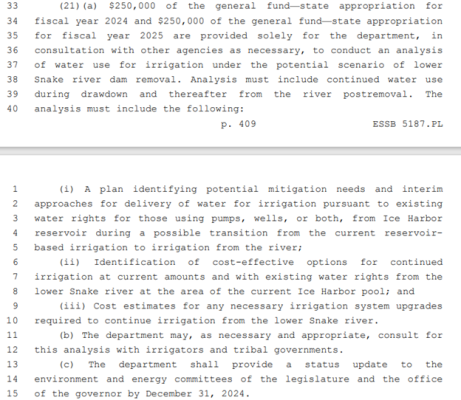
Chris Corry of the Washington Policy Center discusses the wide variety of issues with Washington’s 2023-2025 Operating Budget
Chris Corry
Washington Policy Center

Governor Jay Inslee has signed the 2023-2025 Operating Budget into law. This record-setting budget (almost $70 billion) had a variety of issues we were watching to see if the governor would veto. We will discuss some of those items that survived as well as highlight some interesting vetoes in the operating budget.
Tax transparency
We are happy to report that the funding for an implementation plan of a tax transparency database for Washington state has survived the governor’s veto (he vetoed a prior version in 2018). WPC first made the recommendation for this taxpayer resource back in 2008 after the successful launch of www.fiscal.wa.gov (another of our recommendations).

The funding came as a result of bipartisan legislation introduced during the 2023 session (additional information here).
Part of WPC’s mission is for government transparency. An online, searchable database of tax information is essential for Washingtonians to see a complete picture of all the taxes they are paying. This budget allocation is a good step to making that a reality.
Funding for voluntary stewardship
Another bit of good news in the budget is funding for education for riparian buffer zones. While not the voluntary stewardship legislation that was covered by WPC’s Center for Agriculture this is a step in the right direction.

Another Dam Study!
The budget includes more funding for a study on “the potential scenario of lower Snake River dam removal.”

Todd Myers, WPC’s Environmental, had this to say:
“The governor admits that we are many years from even being able to destroy the dams. Spending millions on yet another study that will be obsolete is a waste of money. Meanwhile, funding for the Salmon Recovery Funding Board was cut by 25 percent compared to the last biennium. Salmon recovery funding should go to projects on the ground, not to another study on the shelf.”
Other veto notes
House Bill 1436 provided additional funding for Special Education. Section 2 of the bill required a performance audit of the state’s special education system. The governor vetoed that section citing student record privacy and thus removed funding for the performance audit in the operating budget.
WPC’s Liv Finne noted:
“Auditing special education funding is needed to hold the public schools accountable for educating special needs children. For decades public schools have underserved children with special learning needs. The governor’s veto is yet another example of the public school system’s unresponsive and uncaring attitude towards this population of students.”
You can find all three state budgets and the governor’s partial vetoes here.
Chris Corry is the director of the Center for Government Reform at the Washington Policy Center. He is also a Washington state representative, serving the 14th Legislative District.
Also read:
- Opinion: OIC tells consumers not to pay for ‘insurance’ you won’t likely benefit from: Does that include WA Cares?Elizabeth New (Hovde) of the Washington Policy Center believes you should consider yourself warned by the Office of the Insurance Commissioner about WA Cares and its maybe-only benefit.
- Opinion: Same road, different speed limit?Target Zero Manager Doug Dahl addresses a question about speed limit signs going into and leaving town.
- Opinion: Hiding the growing cost of the Interstate Bridge replacementJoe Cortright of the City Observatory addresses the rising cost of the Interstate 5 Bridge replacement project.
- Letter: ‘This election I am NOT voting for Greg Cheney’Clark County resident Wynn Grcich shares her thoughts on Rep. Greg Cheney and the issue of fluoridation in area drinking water.
- POLL: Should biological males who identify as females be allowed to compete in athletic events against biological females?Should biological males who identify as females be allowed to compete in athletic events against biological females?










